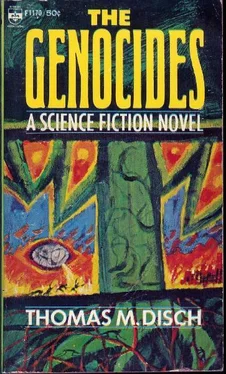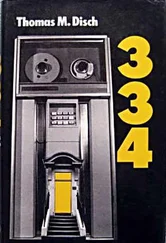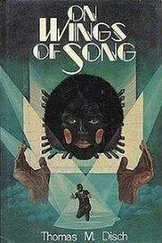THE GENOCIDES
by Thomas M. Disch
The harvest is past, the summer is ended, and we are not saved.
Jeremiah 8, 20
As the lesser and then the greater stars disappeared in the advancing light, the towering mass of the forest that walled in the cornfield retained for a while the utter blackness of the night. A light breeze blew in from the lake, rustling the leaves of the young corn, but the leaves of that dark forest did not stir. Now the eastern forest wall glowed gray-green, and the three men waiting in the field knew, though they could not yet see it, that the sun was up.
Anderson spat—the day’s work had officially begun. He began to make his way up the gentle incline toward the eastern forest wall. Four rows away on either side of him, his sons followed—Neil, the younger and larger, on his right hand, and Buddy on the left.
Each man carried two empty wooden buckets. None wore either shoes or shirts, for it was midsummer. Their denims were in tatters. Anderson and Buddy had on wide-brimmed hats woven of crude raffia, like the coolie hats you used to get at carnivals and state fairs. Neil had sunglasses but no hat. They were old; the bridge had been broken and mended with glue and a strip of that same fiber from which the hats had been made. His nose was calloused where the glasses rested.
Buddy was the last to reach the top of the hill. His father smiled while he waited for him to catch up. Anderson’s smile was never a good sign.
“You’re sore from yesterday?”
“I’m fine. The stiffness comes out when I get working.”
Neil laughed. “Buddy’s sore because he has to work. Ain’t that so, Buddy?”
It was a joke. But Anderson, whose style it was to be laconic, never laughed at jokes, and Buddy rarely found very funny the jokes his half-brother made.
“Don’t you get it?” Neil asked. “ Sore . Buddy’s sore because he has to work.”
“We all have to work,” Anderson said, and that pretty well ended what joke there had been.
They began to work.
Buddy withdrew a plug from his tree and inserted a metal tube where the plug had been. Below the makeshift spigot he hung one of the buckets. Pulling the plugs was hard work, for they had been in place a week and had stuck fast. The sap, drying about the plug, acted as a glue. This work seemed always to last just long enough for the soreness—of his fingers, his wrists, his arms, his back—to reassert itself, but never to abate.
Before the terrible work of carrying the buckets began, Buddy stopped and stared at the sap trickling through the pipe and oozing, like lime-green honey, into the bucket. It was coming out slowly today. By the end of the summer this tree would be dying and ready to be cut down.
Seen up close, it didn’t seem much like a tree at all. Its skin was smooth, like the stem of a flower. A proper tree this size would have split through its skin under the pressure of its own growth, and its trunk would be rough with bark. Farther back in the forest, you could find trees, big ones, which had reached the limit of their growth and begun at last to form something like bark. At least their trunks, though green, weren’t moist to the touch like this one. Those trees—or Plants, as Anderson called them—were six hundred feet tall, and their biggest leaves were the size of billboards. Here on the edge of the cornfield the growth was more recent—not more than two years—and the highest stood only a hundred and fifty feet tall. Even so, here as deeper in the forest, the sun came through the foliage at noonday as pale as moonlight on a clouded night.
“Get the lead out!” Anderson called. He was already out in the field with his full buckets of sap, and the sap was brimming over Buddy’s buckets too, Why is there never time to think? Buddy envied Neil’s mulish capacity just to do things, to spin the wheel of his cage without wondering overmuch how it worked.
“Right away!” Neil yelled from a distance.
“Right away!” Buddy echoed, thankful his half-brother too had been caught up in his own thoughts, whatever they could be.
Of the three men working in the field, Neil surely had the best body. Except for a receding chin that gave a false impression of weakness, he was strong and well proportioned. He was a good six inches taller than his father or Buddy, both short men. His shoulders were broader, his chest thicker, and his muscles, though not so well knit as Anderson’s, were bigger. There was, however, no economy in his movements. When he walked, he lumbered. When he stood, he slouched. He endured the strain of the day’s labor better than Buddy simply because he had more material to endure with. In this he was brutish, but worse than being brutish, Neil was dumb, and worse than being dumb, he was mean.
He is mean , Buddy thought, and he is dangerous . Buddy set off down the row of corn, a full bucket of sap in either hand and his heart brimming with ill-will. It gave him a sort of strength, and he needed all the strength he could muster, from whatever source. His breakfast had been light, and lunch, he knew, wouldn’t be quite enough, and there’d be no dinner to speak of.
Even hunger, he had learned, provided its own kind of strength: the will to wrest more food from the soil and more soil from the Plants.
No matter how much care he took, the sap splattered his pants legs as he walked, and the tattered fabric stuck to his calf. Later, when the day was hotter, his whole body would be covered with sap. The sap would bake dry, and when he moved, the stiffened cloth would tear out the crusted hairs of his body, one by one. The worst of that was over now, thank heaven—the body has a finite number of hairs—but there were still the flies that swarmed over his flesh to feed on the sap. He hated the flies, which did not seem to be finite.
When he had reached the foot of the decline and was in the middle of the field, Buddy set one bucket down and began to feed the thirsty young plants from the other. Each plant received about a pound of thick green nutrient—and to good effect. It wasn’t the Fourth yet, and already many plants were up over his knees. Corn would have grown well in the rich lake-bottom soil in any case, but with the additional nourishment they drew from the stolen sap, the plants throve phenomenally—as though they were in central Iowa instead of northern Minnesota. This unwitting parasitism of the corn served another purpose besides, for as the corn throve, the Plants whose sap they had drunk died, and each year the limit of the field could be pushed a bit farther.
It had been Anderson’s idea to pit the Plant against itself this way, and every corn plant in the field was a testimony to his, judgment. Looking down the long rows, the old man felt like a prophet in full view of his prophecy. His regret now was that he hadn’t thought of it sooner—before the diaspora of his village, before the Plants had vanquished his and his neighbors’ farms.
If only…
But that was history, water under the bridge, spilt milk, and as such it belonged to a winter evening in the commonroom when there was time for idle regrets. Now, and for the rest of that long day, there was work to do.
Anderson looked about for his sons. They were straggling behind, still emptying their second buckets over the roots of the corn.
“Get the lead out!” he yelled. Then, turning back up the hill with his two buckets empty, he smiled a thin, joyless smile, the smile of a prophet, and spat out, through the gap between his front teeth, a thin stream of the juice of the Plant that he had been chewing.
Читать дальше












